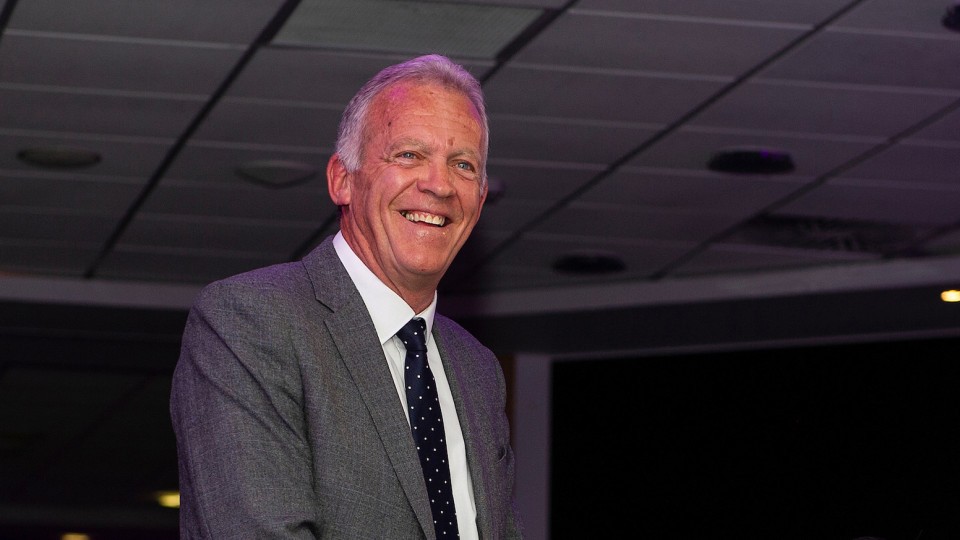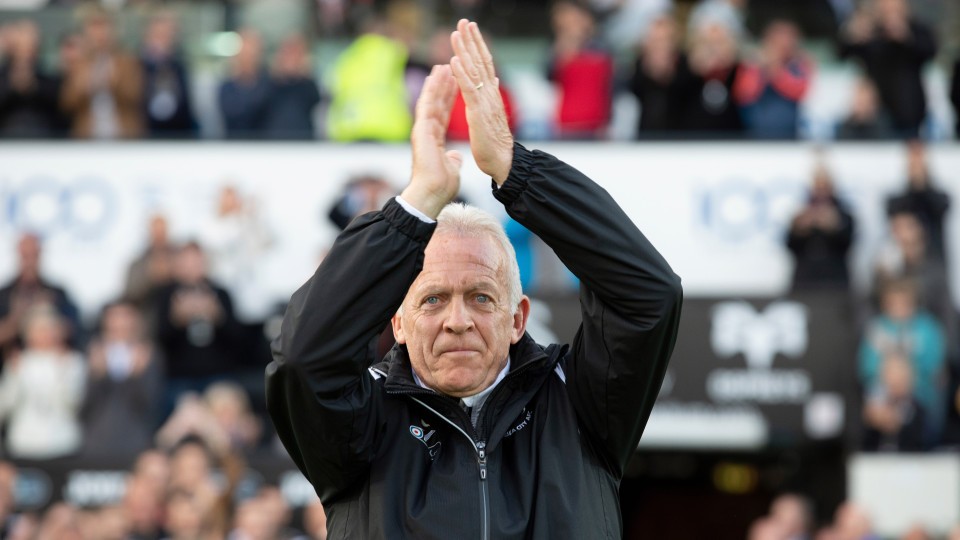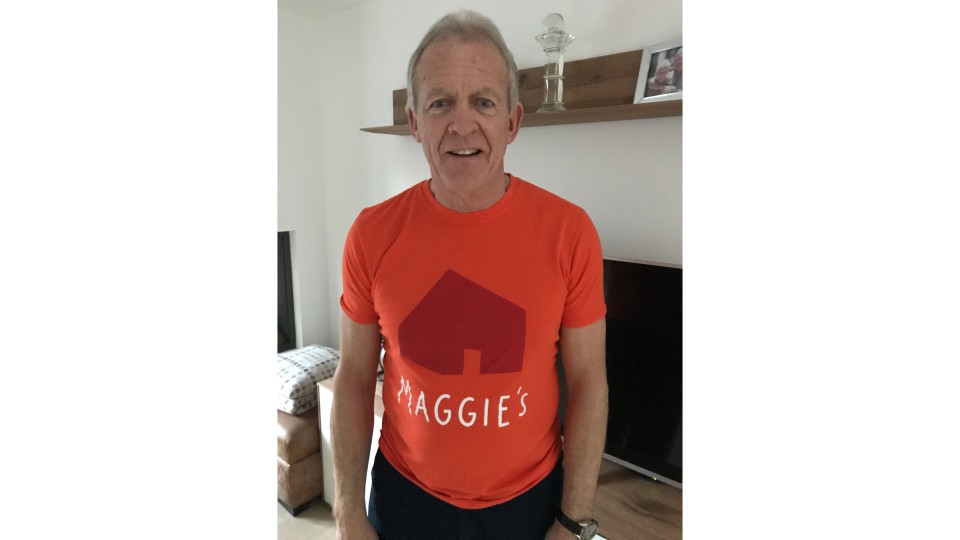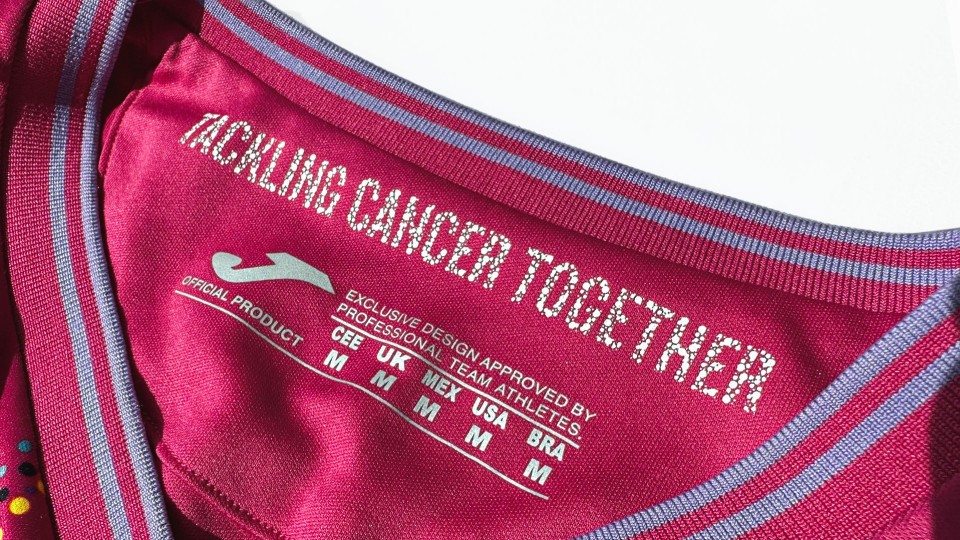Alan Curtis | My cancer diagnosis came out of the blue, it's so important to get checked
Alan Curtis knows better than most how important it is for men to check themselves and be aware of the symptoms and risks of prostate and testicular cancer, because his own diagnosis came completely out of the blue.
The Swansea City great had no idea what awaited him when he went to his local GP expecting to have his ear syringed a decade ago.
Within a few weeks, he was sitting down with his family to tell them he had cancer, and weighing up the treatment options available to him.
It was a head-spinning period for Curtis and his family and – with November being men’s health awareness month and the former striker being an ambassador for the club’s charity partner Maggie’s – he felt it was important to share his story in detail and encourage men to make sure they regularly check and educate themselves.
Prostate cancer is the most common form of cancer among men in Wales and figures from Cancer Research UK show that one in eight men in Wales will be diagnosed with prostate cancer at some point in their lives.
And Curtis hopes raising awareness and encouraging men to regularly be mindful of the symptoms and the need to seek medical advice and attention should they have any concerns.
“My experience underlines the importance of being checked out, because there was nothing that was really worrying me. It was really the intervention of my GP that got me to get examined and then pursue the treatment,” he says.
“It was probably only once the whole thing had run its course that I realised how important it had been that it had been caught so soon. I was fortunate where a lot of people are not so fortunate.
“I would advise anybody, and I say it regularly to people I know and see, to get themselves checked out. If you have any kind of symptoms, or even if you have no symptoms but are of a certain age, then get yourself checked.
“It is so important and so vital, the earlier and quicker you get a diagnosis the better the chances of successful treatment."

Curtis himself had noticed he was starting to need to go to the bathroom more often during the night, and the sense that he had not been able to pass all the urine he needed to, but admits he had not been unduly alarmed.
“My diagnosis only happened because I had gone to see my doctor because I had a blockage in my ear and I wanted to clear it," he says.
“I made the appointment and saw my GP, he told me to come back later in the week to see a nurse and we had a chat about my general health.
“I felt fine but I mentioned there were a couple of things I mentioned like the fact I was going back and forth to the toilet in the night, and I had a slightly uncomfortable feeling that I had not fully emptied myself.
“We kept chatting, but he kept coming back to that and he asked if I had ever had a prostate exam. I told him I hadn’t and he felt it would be advisable for me to do so.
“It was one of those things where I expected him to tell me to go down to Singleton or Morriston for a blood test.
“Instead, without going into too much detail, he reached into a draw, pulled out a tub of gel and put some rubber gloves on. This was 10 minutes after I thought I was going in to have my ear syringed, instead I am having a prostate exam there and then.
“He could feel there was something that needed to be looked at, he did not want to panic me, it was more just saying what the next step would be.
“A couple of weeks later I went to Morriston to see a specialist and he did a biopsy. He took about 15 or 16 samples and when the results came back I think five or six of them were showing signs of cancer.
“That was a shock and I was referred up to Felindre to see an oncologist called Jason Lester. From there we decided which treatment we would pursue.”
Curtis admits the initial shock was hard to deal with, even though the prognosis was positive due to the disease being caught at an easy stage.
But the process of talking it through with his family, and with his oncologist, proved invaluable in terms of his mental health, and the former Wales international would encourage anyone to talk through the range of emotions that come with a cancer diagnosis.

That experience would also lead Curtis to an unexpected realisation, when upon his first encounter with his oncologist he felt like he had previously met him.
“I know Clare mentioned when we launched the kit that I did not tell her immediately, I waited until after she had got home from a night out with friends,” says Curtis.
“I think part of that is saying the word ‘cancer’. It’s the Big C as they say, and that is what gets everyone, it can be daunting and terrifying.
“They stressed to me it was in the early stages and I was fairly secure in the knowledge that I had a good chance of being able to overcome it, even while knowing there would be difficult periods along the way.
“I went up to Felindre, the options were to leave it for six months – which I did not want to do as I wanted it dealt with immediately – to have radiotherapy; but the one we went for was called brachytherapy.
“That involves putting radioactive seeds into the prostate. The radioactivity fades over time, but it helps to treat the cancer.
“It sounded the best option, although it was only available to me because we had caught it early.
“My prostate specific antigen (PSA) level was about 10 or 12, so it was in the right realms for the treatment to be effective.
“I was nervous before I went in for the conversation but it was quite amazing that Jason, the oncologist, walked in and I immediately felt I knew him.
“It turned out he was a Swansea season-ticket holder and he used to sit behind the dugout. Before games I would wave to some of the people there, and I could never have known that one of those same people would play such a huge part in my life.
“It was great and we ended up spending the next 20 minutes talking out Michu, Wilfried Bony and Michael Laudrup and how things were going. In the end, Clare had to give me a nudge and say we needed to talk about the cancer and a treatment plan.
“From there it was a question of being tested every couple of months, then every six months and it is every 12 months now. My PSA reading has been around 0.1 for the last nine years, so touch wood that continues.”
While Curtis did not utilise the services of Maggie’s at the time, within 12 months he would agree to become an ambassador for their Swansea centre, which provides free support and guidance for anyone in our community who has faced a cancer journey.
Having witnessed first hand the incredible work Maggie’s do across a number of areas – from mental health to benefits support, as well as relaxation and coping techniques such as yoga and meditation, Curtis could not be more proud to be associated with the charity.
“I had been aware of Maggie’s but not in the level of detail where I knew everything that they offered,” recalls Curtis.

“It was Sarah Hughes, who was my nurse. She left the NHS to work for Maggie’s, and she got in touch with me about being an ambassador.
“I got invited down to Maggie’s, and it is a fantastic setup and a wonderful place. The work they do is incredible but they face challenges in terms of the finance to keep the place going.
“But the biggest thing for me was that the centre is a place that is there to help people in our area and our community.
“That was so important for me because the money being raised was to help people in the locality.
“They had a hard time during Covid but every time you go in there, there is a warm welcome, a smile and a nice cup of tea. They are so good at what they do.
“I used to go and meet up with a group on a Wednesday that was made up of men who had prostate cancer, and some of the readings were very high but everyone there got the support they needed from the group, they were positive and got strength from being in those sessions, knowing the issues they face or the troubles they have are being shared.
“I would recommend them to anyone. I only truly discovered Maggie’s after my treatment had ended but what they do is incredible.
“You do not have to be suffering from cancer yourself to use their services, it is there for friends and families, for carers.
“They had sessions for children there too, some of whom had sadly lost a parent. It’s a wonderful place and I am so proud to be playing a small part in their work.
“I would urge anyone to pluck up the courage to visit Maggie’s, because it does take courage to do it, it’s not easy.
“But it is such a warm and welcoming place. If it’s not for you, that is fine, but there are so many people who will tell you how brilliant it was for them.”
Curtis has been delighted to see two organisations he cares deeply about – Swansea City and Maggie’s – combine for the ‘Tackling Cancer Together’ campaign.

The initiative is centred around sharing stories and raising awareness of the struggles that come with a cancer diagnosis, and is tied in with our eye-catching third kit, which features a vibrant pink design complemented by the colours representing some of the most common types of cancer.
Each sale of the jersey helps raise vital funds for Maggie’s, who rely on public fundraising efforts to keep the lights on and deliver their services; with the sum required set to be approximately £700,000 for 2024.
“I am so proud of the club,” he said.
“I always am, but I think the shirt and the campaign around it are brilliant and it’s so important for Maggie’s, because they rely on fundraising to help them do what they do.
“The shirt looks brilliant and I love seeing us wear it, and I hope it will help make people aware of Maggie’s and what they offer, and help raise funds for a charity which serves so many in our local community.”
To find out more about the #TacklingCancerTogether campaign and how you can donate to Maggie's, click here.